When it comes to boiler repair, knowing when to call in a professional can save you time and prevent costly mistakes. You might feel confident tackling minor issues, but certain warning signs—like unusual noises or persistent leaks—signal that it’s time to seek expert help. Ignoring these can lead to serious safety risks or even more extensive damage. So, how do you distinguish between a simple fix and a situation that requires a technician? Understanding the nuances could make all the difference in keeping your home safe and warm.
Common Boiler Problems
When it comes to boiler issues, understanding the common problems can save you time and money. One of the most frequent issues you might encounter is a lack of heat. If your radiators aren’t warming up, it could be due to trapped air or low water levels. You can often resolve this by bleeding the radiators or checking the pressure gauge.
Another common problem is strange noises coming from the boiler. You might hear banging, gurgling, or whistling sounds, which typically indicate air in the system, a buildup of limescale, or even a faulty pump. Addressing these noises promptly can prevent more serious damage down the line.
Leaks are another issue to watch for. If you notice water pooling around your boiler, it could be a sign of a worn-out valve or a corroded pipe. Ignoring leaks can lead to significant water damage, so it’s best to investigate immediately.
Lastly, if your boiler frequently shuts off, it could be an issue with the thermostat or a malfunctioning safety feature. Regular maintenance can help identify these problems before they escalate, keeping your boiler running efficiently.
Warning Signs to Watch For
You might notice several warning signs that indicate your boiler needs attention.
First, pay attention to any unusual noises, like banging, clanking, or hissing. These sounds can signal internal issues or air in the system that needs addressing.
Next, check for leaks. If you see any water pooling around your boiler, it could indicate a serious problem that requires immediate action.
You should also be alert for changes in pressure. If the pressure gauge drops below the recommended level, it could mean a malfunctioning component.
A sudden increase in your energy bills is another red flag. If you’ve noticed a spike without any change in usage, your boiler may be working harder than it should, signaling inefficiency.
Lastly, if you ever smell gas or detect an unusual odor around your boiler, evacuate the area immediately and contact a professional. Gas leaks can be extremely dangerous.
DIY vs. Professional Repair
Deciding between DIY boiler repair and calling in a professional can be challenging. You might feel tempted to tackle minor issues yourself, especially if you’re handy or looking to save some money.
However, it’s essential to weigh the pros and cons before diving in.
If you’re dealing with simple tasks like replacing a thermostat or bleeding radiators, your skills may suffice. But remember, even minor mistakes can lead to bigger problems or safety hazards. If you’re unsure about what you’re doing, it’s best to step back.
On the other hand, for more complex issues like leaks, strange noises, or irregular heating, professional help is often necessary. Professionals have the training and experience to diagnose and fix problems quickly and safely.
They’re also familiar with local codes and regulations, ensuring your boiler operates within legal guidelines.
Ultimately, trust your instincts. If you feel confident in your abilities and the issue seems manageable, go ahead with DIY.
But if there’s any doubt, it’s always wiser to call in a technician. Prioritizing safety and efficiency should guide your decision-making process.
Choosing a Qualified Technician
Finding the right technician for your boiler repair can make all the difference in ensuring the job is done correctly and safely. When selecting a professional, you’ll want to consider a few key factors.
First, check for proper licensing and insurance. This protects you from liability and ensures the technician has met industry standards.
Next, look for experience and expertise. A technician with a solid track record in boiler repairs will likely provide better service. Don’t forget to read reviews and ask for references; hearing from previous customers can give you valuable insight into their work ethic and reliability.
Here are some important qualities to look for:
- Certification: Ensure they hold relevant certifications for boiler repair.
- Experience: Choose someone with extensive experience in handling your specific boiler type.
- Availability: Check if they’re available for emergency repairs when needed.
- Warranty: Ask about warranties on their work, which can provide peace of mind.
Maintaining Your Boiler Efficiently
Regular maintenance is crucial for keeping your boiler running smoothly and efficiently.
You’ll want to schedule annual inspections with a qualified technician to catch any potential issues before they escalate. They’ll check for leaks, test pressure levels, and ensure all components are functioning properly.
In addition to professional inspections, you can perform simple maintenance tasks yourself.
Start by regularly checking the pressure gauge. If it’s too low, you might need to add water to the system. Also, inspect the boiler for any visible leaks or corrosion, as these can indicate bigger problems.
Don’t forget about the air vents.
Make sure they’re clear of obstructions to allow for proper airflow. If your boiler has a flue, check for blockages as well. Keeping these areas clear will help maintain efficiency.
Conclusion
In conclusion, knowing when to seek professional help for your boiler is key to keeping it safe and efficient. While you can tackle minor tasks, don’t hesitate to call a qualified technician for more serious issues like leaks or strange noises. Trusting experts not only prevents further complications but also ensures your home stays comfortable and secure. Remember, regular maintenance can go a long way in preventing problems, so keep your boiler in top shape!
